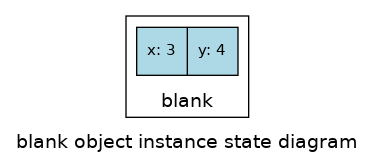8.2. Point objects¶
As a simple example of a compound structure, consider the concept of a mathematical point. At one level, a point is two numbers (coordinates) that we treat collectively as a single object. In mathematical notation, points are often written in parentheses, with a comma separating the coordinates. For example, \((0, 0)\) indicates the origin, and \((x, y)\) indicates the point \(x\) units to the right and \(y\) units up from the origin.
A natural way to represent a point in C++ is with two doubles. The
question, then, is how to group these two values into a compound object,
or structure. The answer is a struct definition:
struct point {
double x;
double y;
};
struct definitions appear outside of any function definition,
usually at the beginning of the program (after the include
statements).
This definition indicates that there are two elements in this structure,
named x and y. These elements are called instance variables,
for reasons I will explain a little later.
Warning
It is a common error to leave off the semi-colon at the end of a structure definition. It might seem odd to put a semi-colon after a curly-brace, but you’ll get used to it.
Once you have defined the new structure, you can create variables with that type:
point blank;
blank.x = 3.0;
blank.y = 4.0;
The first line is a conventional variable declaration: blank has
type point. The next two lines initialize the instance variables of
the structure. The “dot notation” used here is similar to the syntax for
invoking a function on an object, as in fruit.size(). Of course,
one difference is that function names are always followed by an argument
list, even if it is empty.
The dot notation is officially called the member access operator because it is the operator used to access the members of a struct.
The result of these assignments is shown in the following state diagram:

As usual, the name of the variable blank appears outside the boxes and
its value appears inside the boxes. In this case, that value is a compound
object with two named instance variables.
- blank.x = 3.0;
- This declaration would not work for the specific code block below.
- point.x = 3.0;
- The specific name of the structure should be used, not its type.
- nice.x = 3.0;
- Yes, we can access and modify the instance variables using the member access operator.
- nice.x = 3.0
- The semi-colon is missing at the end.
Q-1: Which of the following would be the correct way to initialize the instance variables
of the point object?
struct point () {
double x;
double y;
};
int main() {
point nice;
}
Construct a block of code that correctly creates variables of a certain structure’s type.
- outside of any function definition, usually at the beginning of the program
- Read over the other answer choices as well.
- after the main function
- The struct cannot be defined after the main function or else it can't be used in the program.
- after the include statements
- Read over the other answer choices as well.
- both a and c
- Yes, structs are usually defined after the include statements and before the main function.
Q-3: When do struct definitions occur?